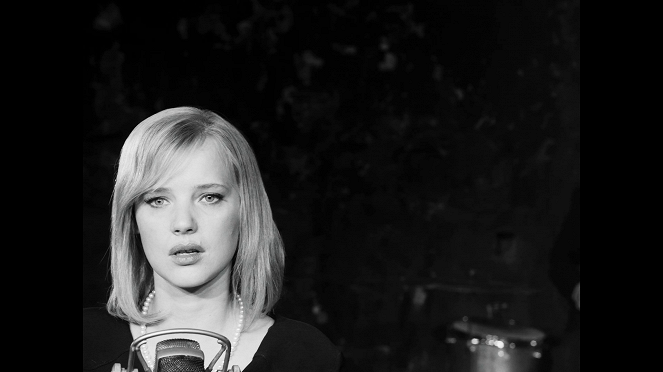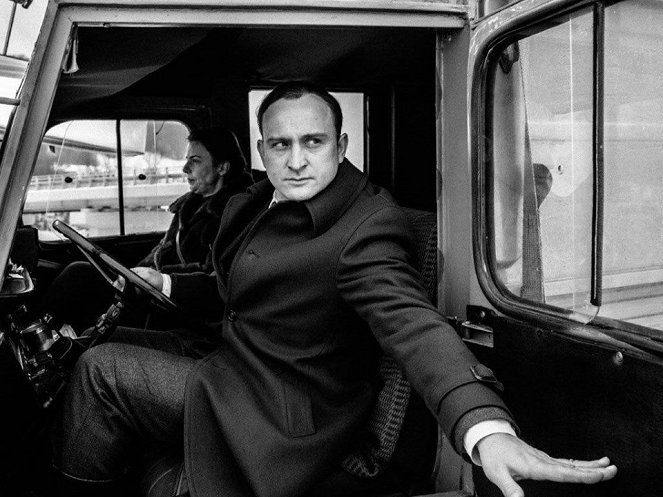Directed by:
Paweł PawlikowskiCinematography:
Łukasz ŻalCast:
Joanna Kulig, Tomasz Kot, Borys Szyc, Agata Kulesza, Cédric Kahn, Jeanne Balibar, Adam Woronowicz, Adam Ferency, Dražen Šivak, Slavko Sobin, Aloïse Sauvage (more)VOD (1)
Plots(1)
This sweeping, delirious romance begins in the Polish countryside, where Wiktor (Tomasz Kot), a musician on a state-sponsored mission to collect folk songs, discovers a captivating young singer named Zula (Joanna Kulig, in a performance for the ages). Over the next fifteen years, their turbulent relationship will play out in stolen moments between two worlds: the jazz clubs of decadent bohemian Paris, to which he defects, and the corrupt, repressive Communist Bloc, where she remains—universes bridged by their passion for music and for each other. Photographed in luscious monochrome and suffused with the melancholy of the simple folk song that provides a motif for the couple’s fateful affair, Paweł Pawlikowski’s timeless story—inspired by that of his own parents—is a heart-stoppingly grand vision of star-crossed love caught up in the tide of history. (Criterion)
(more)Videos (5)
Reviews (11)
Polish folk songs were never so sexy. Besides that, Pawlikovski’s balladic overview of the history of music and of Europe captivated me with its high-contrast black-and-white camera work and highly economical storytelling with sharp cuts, sudden jumps in time and numerous meanings communicated via the mise-en-scène without verbal explanation, thanks to which the film is able to cover some fifteen years of history in just under ninety minutes. At the same time, the atmosphere remains consistent, while the musical style changes along with the degree of frustration felt by the protagonists, who still do not have that which they desire. Cold War is obviously a film under the spell of post-war European cinema (in addition to its academic format, this is also apparent in the number of European countries and languages represented) – not by any means only Soviet-style musicals such as Tomorrow, People Will Be Dancing Everywhere against which it is critically defined – with which it has much more in common than with reality. At the same time, however, the plot is complicated and lovers are separated by the political repression of the time that discomfited artists in communist countries had to face. The major simplification of socio-political contexts, psychological flatness of the characters and bold stylisation serve well the timeless fatalistic story of unrequited love (in whose case it does not matter too much that we are watching only certain [arche]types instead of full-blooded heroes), but as a statement on a particular time and the people of that particular time, which it also wants to be, Cold War fails for the same reason. But if you want to see a very obliging art film that does not put numerous obstacles in the viewer’s way, it is unlikely that you will see anything nicer in the cinemas. 70%
()
With Ida, Pawlikowski tested my patience with his intimate approach a while ago, but my first encounter with his work was definitely not unpleasant. Cold War is a film of a different caliber in that it is easy to watch without any issues, and it is accessible and pleasant in its own way. The question is whether this characteristic would please Pawlikowski. After all, he clearly wanted to make a drama that would make a more significant statement about his time period and the systems that dictated the direction in Europe back then. The title itself testifies to that. He wanted to show the malice of the great events that dictate the fate of the loving couple, exposing the unfortunate individuals. Unfortunately, he failed to do that, and if you want films that significantly reveal the mechanisms of social movements, you have to look elsewhere, primarily because Pawlikowski chose the wrong protagonists. In order for them to miss each other, they don't need the adversity of political systems because they are perfectly capable of creating obstacles themselves. They are the kinds of people who can keep an entire army of relationship coaches occupied and driven to despair, and at the end of their journey, they have a series of love acrobatics and probably several failed marriages behind them. They confuse love with infatuation and fail in a number of basic skills necessary to maintain a long-term partnership. Cold War is worth seeing because of its cinematography and especially for its musical dimension. Pawlikowski knows the craft of filmmaking, and he also chose solid performers for the main roles. It's just that it lacks the depth he wanted to work with. Overall impression: 75%.
()
I spent my entire youth in communist ugliness, but today I look at it like an exotic animal in a zoo somewhere. Foldyna and Kateřina Konečná probably shed a nostalgic tear at the sight of the Soviets honouring Stalin, but fortunately for the rest of us, our memories have been irretrievably swept away by time. The film thankfully doesn't get too caught up in politics and is aesthetically beautiful, I haven't seen such stunning black and white cinematography in a long time, it's a treasure these days. The love story is simple but touching, the protagonist reminded me of Léa Seydoux, charismatic and beautiful. And she sang beautifully, whether Polish folk songs, which also have something to them, or chanson. The ending is all the more crushing in its austerity, without any cheap tear-jerking.
()
Visually, Pawlikowski excels even more than in the Oscar-winning Ida, which he copied through his black-and-white image and aspect ratio, and at least in the first half hour his film is able to enchant through its ferocious and dynamic direction and the story of a folk singing and dancing choir that must submit to the wishes of the regime. The subsequent main plot, a melodrama about two unsympathetic protagonists who would really like to be together, but do everything they can so that they can't be together, gets tiring faster than the omnipotent song ojojoj.
()
At the first fleeting glance, Cold War is the opposite of Ida. Though it could seem that Pawlikowski, following the success of his inconspicuous breakout film, is banking on festival success and awards, Cold War is surprising in how it differs from Ida in every respect, except for the basic foundation of a purely personal theme and the reflection of Polish historical and moral tragedy through that theme. Nevertheless, this level lies rather on another plane this time and the screen belongs predominantly to a destructive yet elemental romance. It cannot be denied that Pawlikowski has Cold War thought out in detail, thanks to which he does not slide into mannerisms or mere copying of Ida. The storytelling through music, linking the romantic and socio-political storylines with the central motif of music, and the conceptual use of the classic format and primarily the interplay of all of the above-mentioned elements in the interest of the work’s dramaturgy and its narration prove that Pawlikowski is a brilliant director who has matured in the course of his own creative renaissance. Of course, the question arises as to what he will come up with next and whether he will go in a new stylistic direction, or if he will continue to stand at the fore of festival nostalgia following the peak era of auteur filmmaking (at which Marhoul’s The Painted Bird also stands). However, it is also necessary to recognise that Cold War (like The Painted Bird) cannot be viewed in a limited way as a mere assemblage of allusions, as these represent the absolute last of the merits of this refined and emotionally pulsating film.
()



Ads